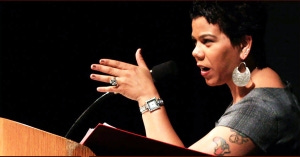Who's Missing From The History Books?
November 4, 2015 By: Kyle Lallatin

“I define my existence by race and land.” Rosa Clemente, acclaimed speaker and activist, came to Viking Hall on October 15 as part of Salem State University’s celebration of Hispanic Heritage Month. The Viking Hall conference room was filled with students from Salem State and Salem High School. Clemente began the discussion reading from her essay entitled “Who is Black?” She detailed her past, telling the audience how she had grown up shunned because no one saw Puerto Rico as part of the African diaspora, and many did not believe in her identifying as Afro-Latina. She then detailed some of her past work, citing her 2008 Green Party presidential run and her work in Ferguson last year.
“We are under a system of white supremacy, patriarchy, and capitalism. If we don’t start there, especially for the young people of color, it’s hurting them.” Clemente believes that oppression of the people of color starts in the system that rules over them. Her solution? “A strong, hard, identity.” Clemente credits her success with having a solid identity, which has allowed her to endure all of the remarks people have made about her heritage. Clemente also backed up a lot of her personal stories with statistics, such as how single women of color have a net worth of $5, compared to white women with $34,000 or how 94% of deportations in the last eight years have been of latinx people.
A lot of what Rosa Clemente said resonated with me. Growing up, many people joked about my racial identity. I am half-black, half-white. I don’t exactly look like it. Both of my brothers are pale white. Therefore, whenever I would express that a racial joke offended me, I would hear the same replies over and over: “you can only be half offended” or “your white half should be laughing.” Having one’s identity suppressed and laughed at is a terrible feeling. I grew up scared of expressing who I am.
Rosa Clemente’s workshop inspired me to be who I am, and proud of it. No longer will I worry about other people’s feelings and let them tell their jokes. My identity isn’t a slur or a detriment. I will be proud of who I am, and proud of all of the sacrifices and hardships people of my race have lived through.
Contributor's Note: Kyle Lallatin is a senior English major at SSU.


